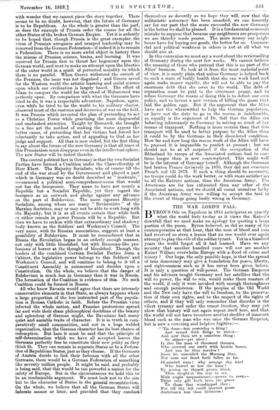THE WAR LORD'S FALL. B YRON'S Ode on Napoleon in 1814
anticipates so exactly what the world feels to-day as it views the Kaiser's downfall that we need make no apology for quoting a large portion of the poem. Byron believed, as did so many of his contemporaries at that hour, that the men of blood and iron had received so stern a lesson that no one would ever again attempt to play the rSie of the soldier tyrant. Yet in a hundred years the world forgot all it had learned. Have we any security that another hundred years will not see another Kaiser William overwhelm Europe with a flood of crime and misery ? Our hope, the only possible hope, is that the spread of true democracy may give a foundation for peace, liberty, and righteousness such as it has never been given before. It is only a question of will-power. The German Emperor and his advisers taught Germany and her satellites that the will to power, the will to win, would make them masters of the world, if only it were invoked with enough thoroughness and enough persistence. If the peoples of the Old World and the New only have the will to freedom, to the preserva- tion of their own rights, and to the respect of the rights of others, and if they will only remember that disorder is the vilest tyranny and order the truest freedom, they may yet show that history will not again repeat itself here, and that the world will not have to endure another shedder of innocent blood such as the man who was once the German Emperor, but is now a cowering and helpless fugitive:— "'Tie done—but yesterday a King ! And armed with Kings to strive—
And now thou art a nameless thing : So abject—yet alive Is this the man of thousand thrones, Who strewed our earth with hostile bones, And can he thus survive ?
Since he, miscalled the Morning Star, Nor man nor fiend hath fallen so far.
Ill-minded man ! why scourge thy kind Who bowed so low the knee By gazing on thyself grown blind, Thou taught'st the rest to see. With might unquestioned,—power to save,— Thine only gift hath been the grave
To those that worshipped thee ;
Nor till thy fall could mortals guess Ambition's less than littleness Thanks for that lesson—it will teach To after-warriors more Than high philosophy can preach, And vainly preached before. That spell upon the minds of men Breaks never to unite again, That led them to adore Those Paged things of sabre-sway, With fronts of brass, and feet of clay.
The triumph, and the vanity,
The rapture of the strife—
The earthquake-voice of Victory, To thee the breath of life ; The sword, the sceptre, and that sway Which man seemed made but to obey,
Wherewith renown was rife—
All quelled !—Dark Spirit ! what must be The madness of thy memory !
The Desolator desolate !
The Victor overthrown !
The Arbiter of others' fate A Suppliant for his own !
Is it some yet imperial hope That with such change can calmly cope ?
Or dread of death alone ?
'To die a Prince—or live a slave—
Thy choice is most ignobly brave !
He who of old would rend the oak, Dreamed not of the rebound ; Chained by the trunk ho vainly broke- Alone—how looked he round ?
Thou, in the sternness of thy strength, An equal deed halt done at length, And darker fate host found : He fell, the forest prowlers' prey ; But thou must eat thy heart away !
But thou—from thy reluctant hand
The thunderbolt is wrung—
Too late thou leav'st the high command To which thy weakness cjung ; All Evil Spirit as thou art, It is enough to grieve the heart To see thine own unstrung ; To think that God's fair world hath been The footstool of a thing so mean ; The Earth bath spilt her blood for him, Who thus can hoard his own !
And Monarchs bowed the trembling limb,
And thanked him for a throne !
Fair Freedom ! we may hold thee dear, When thus thy mightiest foes their fear In humblest guise have shown. Oh ! ne'er may tyrant leave behind A brighter name to lure mankind ! "



































 Previous page
Previous page